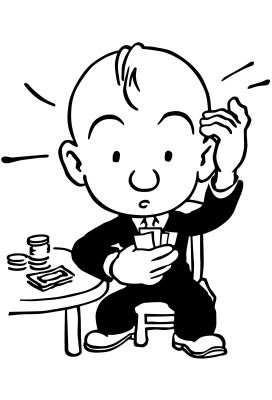
Ernest Hemingway once stated that a short story writer was someone who learned to lie well. He must have been a good liar because he turned out some of the best fiction of his generation and some of his short stories have never been surpassed.
Bluffing is a part of poker. There's no question about that. While there are poker players who rarely bluff and some who never do, a good player needs to make an effective bluff a key part of his game.
It would be great if you drew the right cards to make every hand. While this sometimes seems to occur, all rushes eventually come to an end. When you find yourself fighting for good cards, you need to throw in an occasional bluff just to overcome the rake and the antes.

Every poker player will come to that turn in the road when a bluff is necessary. The trick, of course, is not to be caught bluffing. Once I was caught in a bluff but the player who caught me had a worse hand than I did and I won the pot. We both laughed over it, but his laugh was weaker than mine.
George Hardy was a well-suited executive who worked for Benny and Jack Binion at the Horseshoe in downtown Las Vegas. George earned a six-figure salary that rewarded him handsomely for his work. While he did not play much poker, he had played a serious game before he became a casino executive.
One day I asked him, a bit tongue-in-cheek, to reveal some of his poker playing secrets.
'One of the things I did well as a player was to play the button,' he said. 'I would not look at my cards when I was behind the button, but I would play the players. I'd call on any two cards and then act accordingly. If they checked, I bet. While somebody sometimes showed me a hand, I won 80 to 90 percent of those bets with a sheer bluff.'
He would also occasionally take any two cards he was dealt -- say a deuce seven -- and play them like they were pocket aces.
'If I was the last to act, I would raise with the cards and play them to the river as though I had pocket aces,' he said. 'It was amazing how many pots I won with that kind of play. And sometimes,' he said, smiling, 'the flop would give me two pairs or trips.'
Another successful bluff is to call a raise in early position with any two cards. If the flop is a ragged one with no big cards, come out betting on the flop and the turn. Unless the raiser has a pocket pair, you'll probably win.
When I lived on St. Maarten in the Caribbean, I spent a lot of time at the beach. I remember one Saturday afternoon when I ran into a couple of cocktail waitresses from the Atlantis Casino where I played a lot of poker.
Here we were, me and three beauties in bikinis sipping tropical drinks. Jokingly I asked the girls if they would ever consider marrying a poker player.
Rita shook her head firmly.
'Absolutely not,' she said. 'Poker players bluff too much. If he said he loved me and would be faithful, how could I know he was telling the truth?' The others nodded in agreement. I ordered another round of drinks and just smiled, caught in a bluff.
Practice bluffing until you feel comfortable with what you are doing. If you get caught in a bluff, be sure to end your bluffs for the evening since you'll be called on any future efforts. Bluffing can be a profitable and even fun method of playing poker as long as you don't overdo it. Good luck.
Author: Geno Lawrenzi Jr.
(Geno Lawrenzi Jr. is an international journalist, magazine author and ghostwriter and poker player who lives in Phoenx, AZ. He has published 2,000 articles in 50 magazines and 125 newspapers. If you want to share a gambling story or book idea with him, send an email to glawrenzi@gmail.com ).
Your feedback
Please enter your comment.
Your comment is added.




